This article needs additional citations for verification .(January 2009) |
 | |
| Founder | Bhagat Puran Singh |
|---|---|
Pingalwara is a Sikh charitable organization based in Punjab. [1]
This article needs additional citations for verification .(January 2009) |
 | |
| Founder | Bhagat Puran Singh |
|---|---|
Pingalwara is a Sikh charitable organization based in Punjab. [1]
Pingalwara was founded informally in year 1924 by a then 19-year-old Ramji Das who later became famous as Bhagat Puran Singh

Pingalwara is officially registered as the All India Pingalwara Charitable Society under the Act 1960, Reg. No. 130. Since the death of Bhagat Puran Singh in 1992, it is headed by Dr. Inderjit Kaur who is a physician by training and also runs a private maternity clinic in Sangrur, Punjab.
Pingalwara operates a house for destitutes in Amritsar in northern Indian state of Punjab. It is housed in a three-storey building near the main Amritsar bus stand on the National Highway no. 1, also known as G.T. Road. In this house all the handicapped/diseased people are provided such a shelter that is more like a home. The workers treat all like gifted rather than destitutes. Under the name of this building, there are many other places working selflessly for the same cause that are run by the main organisation. This remarkable institution is the real example of selfless good deeds. Children, widows and old people are able to find that little feeling of love at the most unbearable movements of their lives. The rising number of volunteers show that the people of Amritsar are controlled by the graciousness of the heart.
Currently Pingalwara has facilities for 1080 patients who are fed, housed and looked after thanks to generous support of various philanthropists. The unclaimed bodies of the deceased are donated to Government Medical College, Amritsar for research and teaching purposes.
The main branch houses the Administrative Complex, A Female ward, Children's ward, Rehabilitation Centre, Printing Press, Dispensary, Medical Lab, Dental Centre and the Common Kitchen. [2]
Pingalwara is also involved environmental efforts. [1]
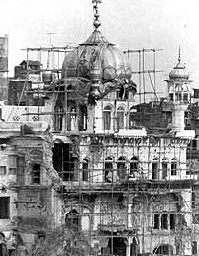
Operation Blue Star was an Indian Armed Forces operation between 1 and 10 June 1984 to remove Sikh militant Jarnail Singh Bhindranwale and other Sikh militants from the buildings of the Golden Temple, famed site of Sikhism.

A gurdwara or gurudwara is a place of assembly and worship for Sikhs but its normal meaning is place of guru or "Home of guru". Sikhs also refer to gurdwaras as Gurdwara Sahib. People from all faiths and religions are welcomed in gurdwaras. Each gurdwara has a Darbar Sahib where the Guru Granth Sahib is placed on a takht in a prominent central position. Any congregant may recite, sing, and explain the verses from the Guru Granth Sahib, in the presence of the rest of the congregation.
The following outline is provides an overview of Sikhism, or Sikhi.
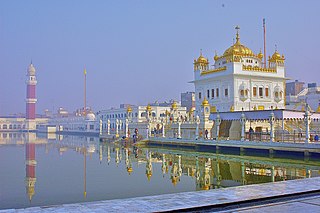
Tarn Taran Sahib is a city in the Majha region of the state of Punjab, in northern India. It is the district headquarters and hosts the municipal council of Tarn Taran district. Gurdwara Sri Tarn Taran Sahib, a prominent Sikh shrine, is located in the central part of the city.
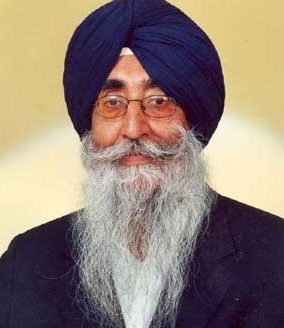
Simranjit Singh Mann is a former Indian Police Service officer and a former Member of the Parliament in the Lok Sabha, the lower house of the Parliament of India, representing the constituency of Sangrur since 2022. He lost elections in 2024 and Gurmeet Singh meet Hayer became new member of parliament. He is the president of the political party Shiromani Akali Dal (Amritsar). Mann has served three-times as an MP; once from Taran Tarn between 1989 and 1991, and twice from Sangrur between 1999-2004 and since 2022. He is known as a Khalistani supporter and his party is known for their pro-Khalistan stances.

The Akal Takht is one of five takhts of the Sikhs. It is located in the Darbar Sahib complex in Amritsar, Punjab, India. The Akal Takht was built by Guru Hargobind as a place of justice and consideration of temporal issues; the highest seat of earthly authority of the Khalsa and the place of the Jathedar, the highest spokesman of the Sikhs.

Bhagat Puran Singh was an Indian writer, environmentalist, and philanthropist. As a young man he decided to dedicate his life to humanitarian work, and in 1947, he established Pingalwara, a home for the sick and disabled in Amritsar. He was also an environmental campaigner, raising awareness of pollution and soil erosion and writing many books about environmental topics.

Khalsa College is a historic educational institution in the northern Indian city of Amritsar in the state of Punjab, India. Founded in 1892, the sprawling 300-acre (1.2 km2) campus is located about eight kilometers from the city-center on the Amritsar-Lahore highway, adjoining Guru Nanak Dev University campus, to which Khalsa College is academically affiliated.
Guru Nanak founded the Sikh religion in the Punjab region of the northern part of the Indian subcontinent in the 15th century and opposed many traditional practices like fasting, Upanayana, idolatry, caste system, ascetism, azan, economic materialism, and gender discrimination.
Honorary Magistrate, Sardar Bahadur, Sir Sobha Singh was an Indian civil contractor, prominent builder and real estate developer of the modern day Delhi.
Patti is an old city, near Tarn Taran Sahib city and a municipal council of the Tarn Taran district in the Majha region of Indian state of Punjab, located 47 Kilometres from Amritsar. Patti city is situated close to the Pakistani border. It is connected through a rail network starting from Amritsar station to Khem Karan station, with Khem Karan being its last station of India.

Punjab has a long history of education.
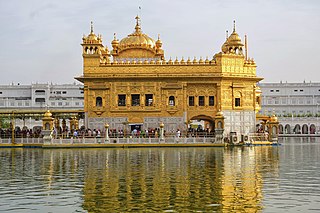
The Golden Temple (also known as the Harmandir Sahib, or the Darbār Sahib, is a gurdwara located in the city of Amritsar, Punjab, India. It is the pre-eminent spiritual site of Sikhism. It is one of the holiest sites in Sikhism, alongside the Gurdwara Darbar Sahib Kartarpur in Kartarpur, and Gurdwara Janam Asthan in Nankana Sahib.
Vikramjit Singh Sahney is an Indian entrepreneur, educationist and social worker. Sahney has been conferred with the honour of Padma Shri by the President of India Smt. Pratibha Patil and International Peace Award by President of Mauritius Anerood Jugnauth at New Delhi. He Rajya Sabha member from Punjab. He has been selected for his contributions in social works.
The Battle of Kup was fought on 5 February 1762, between the Afghan forces of Ahmad Shah Durrani and the Sikhs, under the command of Jassa Singh Ahluwalia and Charat Singh. Ahmad Shah Durrani and the Afghan forces reached Malerkotla, west of Sirhind. They were met by between 30,000 and 50,000 Sikhs. Abdali's forces outnumbered the Sikhs in hand-to-hand combat and the Sikhs couldn't use their usual tactics of hit and run, but had to engage in battle while protecting the civilians at the same time. The Sikhs created a human ring around civilians as protection and fought the battle as they advanced towards Barnala. Abdali was able to break the ring and carried out a full scale massacre of the Sikh civilians. Ahmad Shah's forces killed several thousand Sikhs, and the surviving Sikhs fled to Barnala. According to various different estimates, as many as 5,000 to 30,000 Sikh men, women, elderly and children were killed in what is known as the second Sikh genocide.
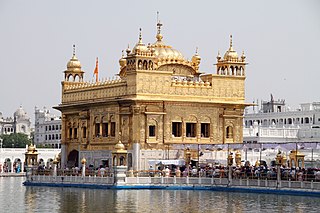
The state of Punjab is renowned for its cuisine, culture and history. Punjab has a vast public transportation and communication network.
Jindowal is a village in Shaheed Bhagat Singh Nagar district of Punjab State, India. It is located 1.6 kilometres (0.99 mi) away postal head office Banga, 15 kilometres (9.3 mi) from Garhshankar, 12 kilometres (7.5 mi) from district headquarter Shaheed Bhagat Singh Nagar and 103 kilometres (64 mi) from state capital Chandigarh. The village is administrated by Sarpanch an elected representative of the village.
Folk practices prevalent in Punjab incorporate local mysticism and refers to the beliefs and practices strictly indigenous to the Punjabi people, of the Punjab region including ancestral worship, veneration of saints, and local festivals. There are many shrines in Punjab which represent the folk religion of the Punjab region which is a discourse between different organised religions. These shrines represent inter-communal dialogue and a distinct form of cultural practice of saint veneration.